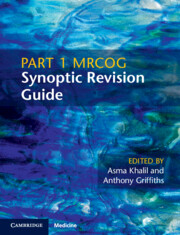Book contents
- Part 1 MRCOG Synoptic Revision Guide
- Part 1 MRCOG Synoptic Revision Guide
- Copyright page
- Contents
- Contributors
- Chapter 1 Physiology of Pregnancy and Labour
- Chapter 2 Fetal Physiology
- Chapter 3 Acid-Base Balance
- Chapter 4 Female Reproductive Physiology
- Chapter 5 Male Reproductive Physiology
- Chapter 6 The Pituitary, Adrenal, Thyroid and Pancreas
- Chapter 7 Congenital Infections
- Chapter 8 Data Interpretation in Obstetrics
- Chapter 9 Clinical Management in Obstetrics
- Chapter 10 Concise Anatomy of the Urinary, Intestinal and Reproductive Tracts within the Pelvic Cavity
- Chapter 11 Concise Anatomy of the Pelvic Floor and Perineum
- Chapter 12 Concise Anatomy of the Pelvic Girdle
- Chapter 13 Concise Anatomy of the Abdominal Walls
- Chapter 14 Early Embryonic Development
- Chapter 15 Development of the Gastrointestinal and Urogenital Tracts
- Chapter 16 Problems in Early Pregnancy
- Chapter 17 Human Immunodeficiency Virus and Other Sexually Transmitted Infections
- Chapter 18 Pharmacokinetics, Pharmacodynamics and Teratogenesis
- Chapter 19 Non-hormonal Therapy in Obstetrics and Gynaecology
- Chapter 20 Drugs in Gynaecology and Contraception
- Chapter 21 Surgical Site Surveillance
- Chapter 22 Data Interpretation in Gynaecology
- Chapter 23 Clinical Management in Gynaecology
- Chapter 24 Carbohydrate Metabolism
- Chapter 25 Fat Metabolism
- Chapter 26 Steroid Hormones and Prostaglandins
- Chapter 27 Calcium Homeostasis and Bone Health
- Chapter 28 Cell Structure and Function
- Chapter 29 Cellular Responses in Disease
- Chapter 30 Pathology of Non-neoplastic and Neoplastic Gynaecological Diseases
- Chapter 31 Implantation and Placental Structure and Function
- Chapter 32 Basic and Reproductive Immunology
- Chapter 33 Molecular Biology
- Chapter 34 Single-Gene and Chromosome Abnormalities
- Chapter 35 Genetic Screening and Diagnosis
- Chapter 36 Biophysics
- Chapter 37 Statistics
- Chapter 38 Clinical Trials, Audit and Meta-analysis
- Appendix: Answers to SBA Questions
- Index
- References
Chapter 25 - Fat Metabolism
Published online by Cambridge University Press: 27 July 2023
- Part 1 MRCOG Synoptic Revision Guide
- Part 1 MRCOG Synoptic Revision Guide
- Copyright page
- Contents
- Contributors
- Chapter 1 Physiology of Pregnancy and Labour
- Chapter 2 Fetal Physiology
- Chapter 3 Acid-Base Balance
- Chapter 4 Female Reproductive Physiology
- Chapter 5 Male Reproductive Physiology
- Chapter 6 The Pituitary, Adrenal, Thyroid and Pancreas
- Chapter 7 Congenital Infections
- Chapter 8 Data Interpretation in Obstetrics
- Chapter 9 Clinical Management in Obstetrics
- Chapter 10 Concise Anatomy of the Urinary, Intestinal and Reproductive Tracts within the Pelvic Cavity
- Chapter 11 Concise Anatomy of the Pelvic Floor and Perineum
- Chapter 12 Concise Anatomy of the Pelvic Girdle
- Chapter 13 Concise Anatomy of the Abdominal Walls
- Chapter 14 Early Embryonic Development
- Chapter 15 Development of the Gastrointestinal and Urogenital Tracts
- Chapter 16 Problems in Early Pregnancy
- Chapter 17 Human Immunodeficiency Virus and Other Sexually Transmitted Infections
- Chapter 18 Pharmacokinetics, Pharmacodynamics and Teratogenesis
- Chapter 19 Non-hormonal Therapy in Obstetrics and Gynaecology
- Chapter 20 Drugs in Gynaecology and Contraception
- Chapter 21 Surgical Site Surveillance
- Chapter 22 Data Interpretation in Gynaecology
- Chapter 23 Clinical Management in Gynaecology
- Chapter 24 Carbohydrate Metabolism
- Chapter 25 Fat Metabolism
- Chapter 26 Steroid Hormones and Prostaglandins
- Chapter 27 Calcium Homeostasis and Bone Health
- Chapter 28 Cell Structure and Function
- Chapter 29 Cellular Responses in Disease
- Chapter 30 Pathology of Non-neoplastic and Neoplastic Gynaecological Diseases
- Chapter 31 Implantation and Placental Structure and Function
- Chapter 32 Basic and Reproductive Immunology
- Chapter 33 Molecular Biology
- Chapter 34 Single-Gene and Chromosome Abnormalities
- Chapter 35 Genetic Screening and Diagnosis
- Chapter 36 Biophysics
- Chapter 37 Statistics
- Chapter 38 Clinical Trials, Audit and Meta-analysis
- Appendix: Answers to SBA Questions
- Index
- References
Summary
Fats have energy-storing, structural and regulatory roles in the body (Table 25.1). Depots of white adipose tissue (WAT) therefore not only function to store energy but also to provide precursors for synthesis of other species. Specific roles are played by certain fatty acids in this regard. For example, long-chain derivatives of the essential fatty acids of the omega 3 series (which cannot be synthesised de novo but must be taken in through the diet and modified) contribute to membrane formation in the CNS and the retina. The importance of the roles played by omega 3 fatty acids in anchoring specific membrane proteins involved in signalling is illustrated by the effects of dietary deficiencies. About ⅔ of the total content of docosahexaenoic acid (22 carbon fatty acid derived from linolenic acid) are assimilated in the final three months of gestation and the remaining ⅓ during the first three months of life. An interruption of supply during these crucial periods produces a measurable adverse effect on the development of cognitive function and of visual acuity.
Information
- Type
- Chapter
- Information
- Part 1 MRCOG Synoptic Revision Guide , pp. 248 - 258Publisher: Cambridge University PressPrint publication year: 2023
